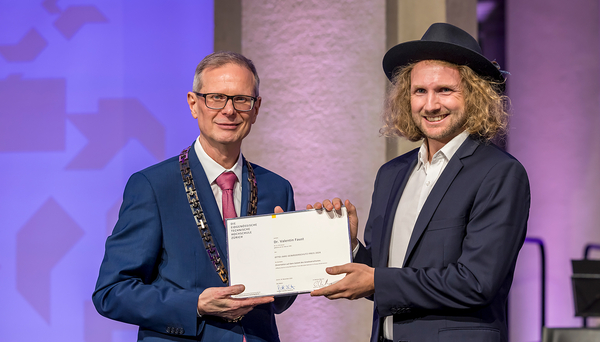News Detail
2024 Otto-Jaag Water Protection Prize for Valentin Faust
November 18, 2024 |
The ETH Zurich awards the Otto-Jaag Water Protection Prize for outstanding master’s and doctoral theses in the field of water protection and hydrology. This year, Valentin Faust received the award during the ETH Day on 16 November for his dissertation on the topic “Effects of pH on urine nitrification: from microbial selection to process performance.”
His work was part of the European Space Agency's MELiSSA Space Research Programme. MELiSSA stands for “Micro Ecological Life Support System Alternative” and aims to develop systems that will enable long-term manned space missions, for example to Mars. This requires regenerative systems that produce food, water and oxygen from waste in the form of closed cycles. The fertiliser used to produce food should to be obtained from urine.
Increasing process stability for use in space
Eawag has been working for a long time on the processes required to enable the recovery of resources from wastewater and to facilitate self-sufficient sanitation systems for places without sewage systems and water connections. The multi-stage process for recovering nitrogen, phosphorus and other nutrients from urine must function particularly reliably and smoothly for use in space. Valentin Faust’s work as a doctoral student in the Process Engineering Department at Eawag therefore aimed to increase the process stability of urine treatment and also to reduce the process’s carbon footprint. In particular, he took a close look at the process step on nitrification, in which bacteria convert the ammonium ions contained in urine into nitrate. This reaction is very sensitive to changes in the pH value. Faust investigated how the pH affects the composition of the microorganisms and the formation of undesirable reaction products such as nitrite and the greenhouse gas nitrous oxide.
To do this, he worked with nitrification reactors on a laboratory and pilot scale, among other things, and modelled the nitrification process in order to be able to predict under which conditions the process comes to a standstill and which operating strategies enable stable and climate-friendly nitrification.
Valuable findings for use on Earth, too
“Valentin Faust’s results provide important insights for the operation of nitrification reactors for the production of fertilisers from human urine,” explains Kai Udert, group leader in the Process Engineering Department at Eawag, who supervised Faust’s doctoral thesis. “This is very valuable for the further development of resource-oriented urban water management with the aim of closing nutrient cycles and protecting water resources."
Valentin Faust is delighted about the award. “I really enjoyed working together with an international team on the challenges of a closed-loop system – for use either on Earth or in space.” He doesn’t know yet what he will do with the prize money. “I’m certainly not buying a flight ticket to the moon.” Following a brief postdoc at Eawag, Faust is now working as a project leader at the University of Applied Sciences of Eastern Switzerland (OST) in the Applied Chemistry research group in the field of wastewater, water and odours.
Cover picture: ETH Rector Günther Dissertori presents Valentin Faust with the 2024 Otto-Jaag Water Protection Prize (Photo: ETH, Alessandro Della Bella).

